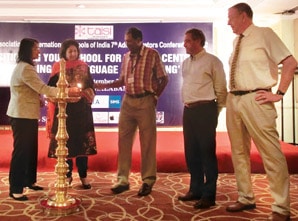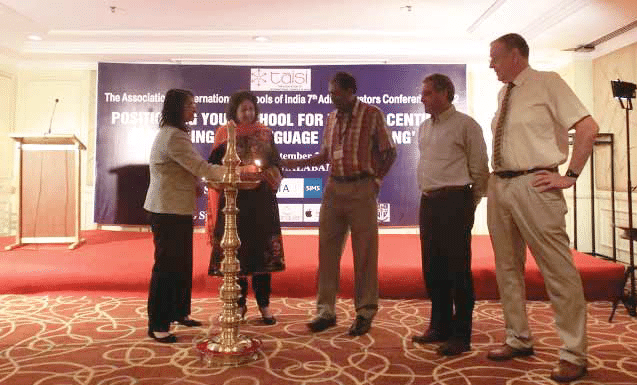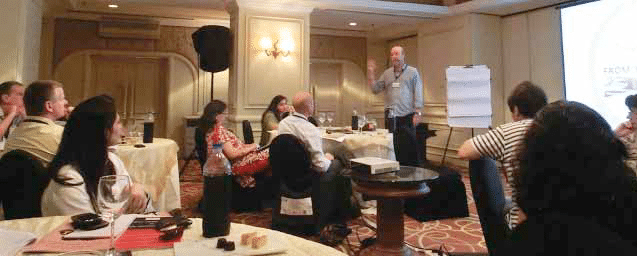
The conference aimed at bringing international schools together on a common platform for the advancement of international education, friendship and intercultural understanding
 The TAISI Teachers and Administrators’ Conference was held at Vivanta Taj at Cochin from September 26-30, 2012. The event was organised by the Association of International Schools in India (TAISI), a nonprofit autonomous body.
The TAISI Teachers and Administrators’ Conference was held at Vivanta Taj at Cochin from September 26-30, 2012. The event was organised by the Association of International Schools in India (TAISI), a nonprofit autonomous body.
The conference was inaugurated by Anu Monga, Head, Bangalore International School; Chairperson, Association of International Schools, India (TAISI). It was attended by 100 participants from 40 International schools, both from India and Abroad. Various sessions were held during the conference to highlight the message of “Positioning your School for the 21st Century: Decoding the Language of Learning”.
The conference was a five-day event. The main aim was to bring international schools together on a common platform for the advancement of international education, friendship and inter-cultural understanding. Various sessions were held by eminent speakers in education.
The first day of the conference saw the launch of the eighth edition of the Guide to School Evaluation and Accreditation by NEASC. This preconference training offered advice on developing international mindedness within the school community and helping develop a learning-focused school. The session by Kevin Bartlett, Director, The International School of Brussels, Belgium, shared his ideas on Total School system where interactive approach is used to design and deliver learning so that a systemic matrix is constructed from disconnected silos. The second session was by Clay Hensley, Director of International Strategy & Relationships, College Board, USA. The workshop was a professional development programme for college counsellors to learn how to help students through the university planning and admission. There was a special video conference session by James Montoya, Vice President, Higher Education Relationship Development, College Board, USA, who talked about college admissions and the transition from high school to college.
| “Times have gone when teachers only used to teach. Now teachers are facilitator of hands on learning. Technology will play a vital role in this. Available technologies need to be remodelled to suit the requirements.” Kavita Sharma, Principal, JG International School |
The second day had Kevin Bartlett, Director, The International School of Brussels, Belgium, talk about making the language of learning easier so that all stakeholders are mobilised for making learning effective. There was a session by Dr Raymond J Wlodkowski, Professor Emeritus, College of Professional Studies, Regis University-Denver; and Dr Margery B Ginsberg, Associate Professor – Department of Educational Leadership, University of Washington-Seattle, on enhancing motivation in students so that they are able to learn effectively and for teachers to be able to devise teaching methods for different disciplines and cultures.
In another session, Punya Mishra, Professor of Educational Psychology and Educational Technology, College of Education, Michigan State University, talked about how technology can change learning in the 21st century. He showcased his thoughts through a presentation. He talked about the ways in which Foundational Knowledge, Meta Knowledge and Humanistic learning can be enhanced in students by creatively rethinking the way technology has to be used. He also introduced the Technological Pedagogical Content Knowledge framework as a way of thinking about teacher knowledge, technology integration and teacher creativity.
| “Learning and sharing best practices in education is most important. It was a wonderful learning experience for all of us.” Sheila Alexander, Principal, Good Shepherd International School |
Dr Jena Nicols Curtis and Dr Judith A Johns, Associate Professors of Health, State University of New York, College at Cortland, talked about how administrators can take actions to help the teachers be connected to the students so that the students feel that the adults in school care about them as individuals. Another session was by Sean O’Maonaigh, Executive Consultant, Advisor and Coach, Professional Development Training International, Vietnam, who delivered a talk on leadership and management skills required for proprietary schools. He outlined the potential solutions for effective integration of all people involved in the school to promote success for everyone in the institution.
The third day saw Sean O’Maonaigh speak on the various ways in which the delivery of professional development is made comprehensive and integrated with the continuous process of school improvement and focused on improving teaching and learning.
In another session, Chris Sherwood, Principal Product Manager, Capita Children’s Services, talked about the strategies required by the school for embedding MIS and how can a well implemented MIS turn a good school into a great school. Dr Jena and Dr Judith had a session on discussing the ways by which students can be loved to improve their academic achievements and social well-being.
The afternoon session had a talk by Stefanie Leong, Head of Development & Recognition, IB Global Centre, Singapore, on increasing support for schools by IB and also to discuss what is required by key education stakeholders from IB to make their programmes stronger. Another session had a very interesting topic by Ellen Deitsch Stern, Head of School, Saigon South International School, Vietnam, who discussed about the various experiences undergone by the teachers in the beginning and end of their career in a school. She talked about how vivid the experience is which can range from exhilaration to despair. Gaurav Monga, Creative Writing Program Developer, Mahatma Gandhi International School, Ahmedabad, had a discussion on how literature is a phenomenological entity. He had a short workshop in which the fabric of a literary work was explored and he showed how the meaning of a literary creative work can be responded by doing creative writing. He thus showed how creative writing is an effective bridge between reading and analytical writing.
 The fourth day had some interesting sessions by leading educationists like Dr Pascal Chazot, Director, Mahatma Gandhi International School, Ahmedabad, who gave a presentation on the various experimental learning carried out in the Mahatma Gandhi School and also showcased the various innovative classroom pedagogies used there. Another interesting session was by James MacDonald, Head of School, Yokohama International School, Japan, who introduced the theory called the ‘Triple Bottom Line’. This theory helps the schools to think about their functioning and aims to provide a way of thinking about the schools priorities and measuring success. He also held a breakout session on the looking at the various ways by which schools can differentiate itself to reduce unhealthy competition between schools and provide better education to meet the needs of the children individually. A young Graduate of MIT and Founder, Camp K-12, Anshul Bhagi talked about the various ways of getting young school students addicted to innovation. He discussed how early exposure to hands-on experiences can be important for moulding the children. He showcased how educational tools from MIT could be implemented in schools to help children build their own apps for computers and phones. Lakita Jaggi, Primary Teacher; Gifted and Talented Co-coordinator Primary, The British School, New Delhi, who had some interesting ideas to share about the various ways of handling and identifying the high achievers and gifted children in the classrooms and how to help these children by increasing the challenges in the classroom for them. Melanie Kells, Dean of Studies, Canadian International School, Bangalore, and Apple Distinguished Educator (ADE) and Apple Professional Development (APD) Trainer, held various hands on sessions on the latest apps, interactive textbooks, and research tools designed by Apple on education.
The fourth day had some interesting sessions by leading educationists like Dr Pascal Chazot, Director, Mahatma Gandhi International School, Ahmedabad, who gave a presentation on the various experimental learning carried out in the Mahatma Gandhi School and also showcased the various innovative classroom pedagogies used there. Another interesting session was by James MacDonald, Head of School, Yokohama International School, Japan, who introduced the theory called the ‘Triple Bottom Line’. This theory helps the schools to think about their functioning and aims to provide a way of thinking about the schools priorities and measuring success. He also held a breakout session on the looking at the various ways by which schools can differentiate itself to reduce unhealthy competition between schools and provide better education to meet the needs of the children individually. A young Graduate of MIT and Founder, Camp K-12, Anshul Bhagi talked about the various ways of getting young school students addicted to innovation. He discussed how early exposure to hands-on experiences can be important for moulding the children. He showcased how educational tools from MIT could be implemented in schools to help children build their own apps for computers and phones. Lakita Jaggi, Primary Teacher; Gifted and Talented Co-coordinator Primary, The British School, New Delhi, who had some interesting ideas to share about the various ways of handling and identifying the high achievers and gifted children in the classrooms and how to help these children by increasing the challenges in the classroom for them. Melanie Kells, Dean of Studies, Canadian International School, Bangalore, and Apple Distinguished Educator (ADE) and Apple Professional Development (APD) Trainer, held various hands on sessions on the latest apps, interactive textbooks, and research tools designed by Apple on education.
| “Such conferences are good platform for sharing and gaining knowledge. IT was informative and insightful as education is about common values.” Sujata Ravindran, Trivandrum International School |
The last day of the conference had Neeraj Manchanda, Managing Partner, Neeraj Manchanda Architects, talk about the changes in the learning environments in the education landscape and also explored the idea of ‘learning everywhere’ in the schools. He discussed the idea of empowering the design team of the school collaboratively. The second session was by Shashank Vira, Independent Educator and Business Advisor, The Hearth, who explored the prospect of celebrating the multicultural aspects of the international curriculum. The last session of the conference had Clay Hensley and William Bickerdike from the College Board talk about the Advanced Placement Programme that can help promote and validate global skills in the children and help them prepare for an increasingly global and interconnected future.






















